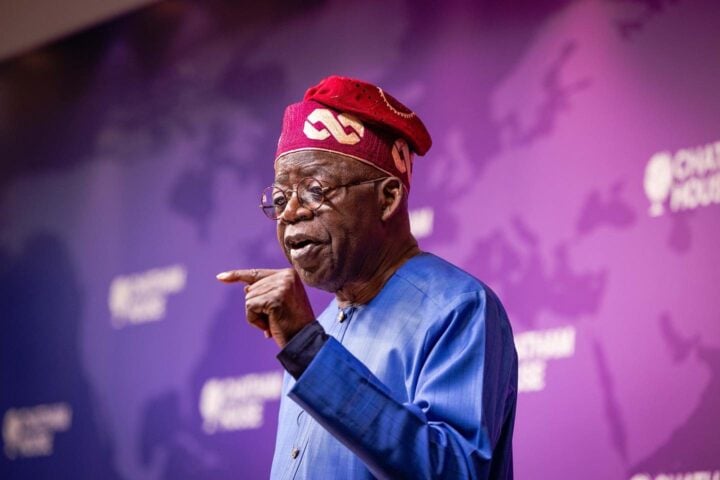Bola Ahmed Tinubu, presidential candidate of the All Progressive Congress (APC), says Nigerians will not have to deal with the challenge of multiple foreign exchange (FX) rates if he is elected president.
Tinubu spoke at luncheon with business owners titled ‘business forward’ on Thursday in Lagos.
Currently, Nigeria operates two foreign exchange (FX) markets: one is the official central bank rate, while the other is at the parallel section also known as black market.
Although the parallel segment is more accessible to traders and businesses who need FX, the Central Bank of Nigeria (CBN) has consistently maintained that it represents less than one percent of forex transactions and should never be used to determine the exchange rate.
Advertisement
Speaking at the event, Tinubu said if he is elected, Nigerians would no longer pay estimated billing for electricity.

Estimated billing is a type of electricity payment system whereby the distribution companies (DisCos) do the billing without the aid of any meter (postpaid or prepaid). This usually results in over-charging customers for power consumed.
“By all means, you must have electricity. And you won’t pay for estimated billing anymore. When I become president, multiple exchange rates will go away. Write it down,” he said.
Advertisement
“My discussion today is to inspire so that the promise of today can be a reality tomorrow. We promise you, we will bring prosperity to Nigeria.”
Speaking further, the presidential candidate promised to take bold decisions that will turn the economy around, including removing fuel subsidy, saying Nigeria will not continue to subsidise fuel consumption in neighbouring countries.
He said he would convert challenges to opportunities for development.
“How can we be subsidising fuel consumption of Cameroon, of Niger, of Benin Republic. No matter how long you protest, we are going to remove subsidy. We can do it. We are educated enough,” Tinubu said.
Advertisement
The former Lagos governor also pledged that his government would give room for private the sector to thrive.
He said his government would not interfere in areas the private sector is doing well.
“Our guiding principle regarding economic policy shall be to provide the right policy framework so that business can flourish,” Tinubu said.
“But I want to do more than help existing businesses to exist. We must create the space where new sectors and lines of business can open. We must grow this economy so that it can accommodate over 200 million people with a decent standard of living.
Advertisement
“My government will collaborate with the private sector to bring about massive infrastructural renewal that enhance economic opportunities, lower business cost and overheads while producing jobs that spur further growth and development through increased consumer demand. This is the virtuous economic cycle we seek to create.
“From our national infrastructural campaign to our national portable water campaign and plans to reticulate major dams, our intention is to leverage public private partnerships to attract private sector investment along the critical path leading from modernisation of infrastructure to realization of sustainable, yet significant economic growth.
Advertisement
“Please also note the various sectors in which we have promised fiscal incentives, tax breaks, tax credits, rebates and access to finance.
“My aim is to develop local manufacturing and value-added businesses. My aim is to deepen consumer lending, increase affordable housing and provide business owners with low-cost loans to modernise operations and improve productivity. My aim is to reform the structural foundation of our economy. To accomplish this major feat, government and the private [sector] must work hand in hand.
Advertisement
“Our policy will further stimulate our world-leading start-up ecosystem. I want our brilliant entrepreneurs to continue to innovate our people out of poverty and lead us towards the path of prosperity.”
Advertisement






